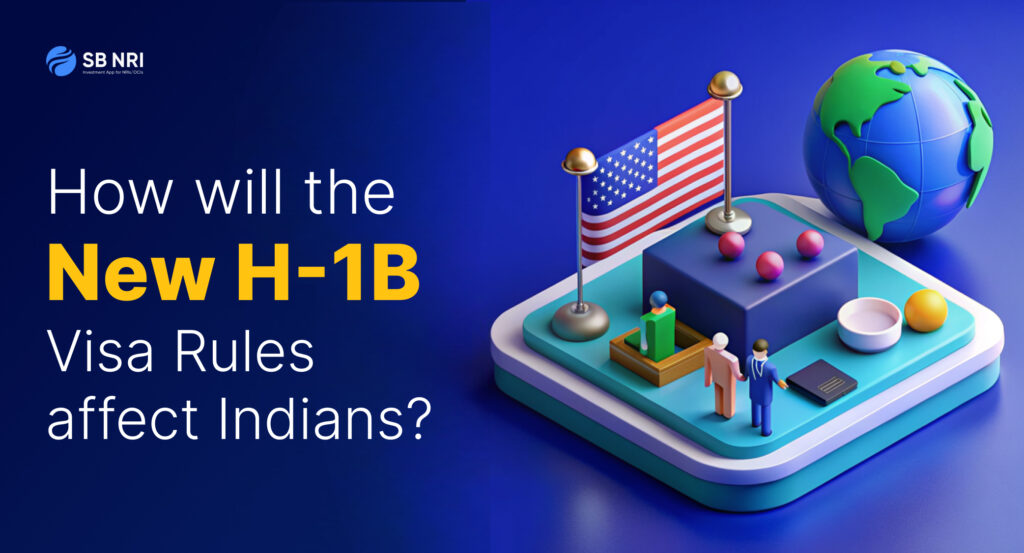
H-1B visas are one of the major ways for immigrant workers to work in the US. Many Indian IT companies send people to US on H1-B visa to work as qualified individuals in specialty occupations. The U.S. Citizenship and Immigration Services (USCIS) is set to announce new H-1B visa regulations on July 8. These changes could significantly impact employers and professionals, especially those from India. After this announcement, there will be a public review time duration before the new rules are finalized. Find out all you need to know about the new H-1B visa rules and how it can affect Indians.
What is an H-1B visa?
The H-1B visa is a U.S. work visa for foreign workers or individuals from other countries working abroad with specialized skills. It allows U.S. employers to hire them for specific roles, usually requiring a bachelor’s degree or the skills required to fill the job position. Eligible fields and occupations include: technology, finance, engineering, and architecture. To apply for an H-1B visa, you need:
- A job offer from a U.S. employer for a specialty role.
- Proof of a bachelor’s degree or similar experience.
- Your employer must prove there are no qualified U.S. applicants for the role.
Also read: US Visas: All You Need to Know about a US Visa for Indians
What is an L-1 visa?
The L-1 visa is a U.S. work visa for employees of multinational companies as it allows such companies to transfer main staff from their foreign offices to the U.S. temporarily. This visa helps companies manage operations, manage overseas projects, and share specialized knowledge. To apply for L-1 visa you need to meet specific eligibility requirement such as:
For the Employee:
- They must be working for an eligible multinational company.
- L-1A: This is for someone working in a managerial or executive role.
- L-1B: This is for someone working and has specialized knowledge.
- For someone who has worked for a foreign company for at least one year in the last three years.
For the Employer:
- Should have a qualifying relationship with the foreign company (parent, subsidiary, affiliate, or branch).
- Employers should operate business in the U.S. and have a physical office.
- Employers should provide a valid job offer and file an L-1 petition with USCIS (U.S. Citizenship & Immigration Services).
Also read: Visa Status: Check Visa Status with Passport Number
What are the new H-1B visa rules for Indians?
The new regulations for H-1B and L-1 visas include many significant changes that could impact both visa holders and employers:
- New Fees for Visa Extensions:
- A $4,000 fee for extending H-1B visas.
- A $4,500 fee for extending L-1 visas.
- These fees are currently only required for initial visa petitions and when changing employers, but the proposed rule will extend these fees to visa renewals as well.
- Redefining Speciality Occupations:
- Job roles that qualify for H-1B visas will now require specific degrees that are directly related to the job opportunity.
- This change aims to make a strict definition of “speciality occupations,” potentially excluding roles considered too general.
- For example, individuals with BBA (business administration) degrees will no longer qualify, as these degrees could be too broad and not stick to specific job requirements.
- Higher Fees for Employers with Many Visa Holders:
- Employers with more than 50% of their workforce on H-1B and L-1 visas may face substantial fees for visa extensions.
- This aims to discourage companies from relying heavily on foreign workers and encourage hiring more local talent.
Also read: US Visa Passport Tracking: How to get passport after interview
What is the impact of new H-1B visa rules?
- On Indian Visa Holders and Applicants:
- Indian professionals, who make up the largest group of H-1B visa holders, will be significantly affected by these changes.
- The increased costs and stricter job role requirements may make it more difficult and expensive for them to live overseas and save.
Wrapping Up
Planned changes to H-1B and L-1 visa regulations, including new extension fees and stricter job role requirements, This will significantly impact Indian professionals and U.S. employers. Indian IT companies, which rely heavily on H-1B visas, will face higher costs and strict criteria for hiring specialized skilled workers. These changes may make it more challenging and expensive for Indian professionals to work in the U.S. and for companies to manage their operations and projects effectively.
You may have queries regarding visa, passport and other taxation issues for NRIs/OCIs. We at SBNRI help resolve the issues regarding complex taxation and other matters. Download the SBNRI App. Also, visit our blog and YouTube channel for more details.
FAQs
What are the fees for the 5 year Indian e-tourist visa?
The cost is US$ 80.00 for a 5 years Indian e-tourist visa.
Is a Yellow Fever Vaccination Card required for citizens of Yellow Fever affected countries?
Yes it is required. Travelers who are unable to show their Yellow Fever Vaccination Card when required will be quarantined for a maximum of 6 days upon arrival.
What time periods is the Indian e-tourist visa available for?
It is available for 30 days or one year or 5 years.
How long can I stay in the US with an H-1B visa?
The H-1B visa is a work authorization for specialty occupations, allowing a cumulative maximum stay of 6 years. Initially, H-1B status is granted for three (3) years, with the possibility of extensions for an additional three (3) years.
What is the new H-1B visa rule?
The new regulations for H-1B and L-1 visas include many significant changes that could impact both visa holders and employers. You can read in detail about the new H-1B visa rules in the above blog.



